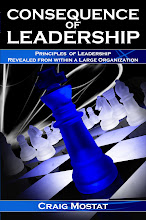I get aggravated whenever I drive through a construction zone, plastered with signs telling me that if I don't drive at a snails pace I will get speeding fines that will require a mortgage to pay off, and I can't find any evidence of construction – no moving vehicle or human being working whatsoever. Construction teams usually cover or remove the slow-down signs when they are done work for the day, but every once in a while I come across the zone where it seems laziness has prevailed when it came time to go home for the day. If I can get a fine for speeding through a construction zone, can the construction company get a fine for not removing the signs when they are done construction?
This may sound like a petty pet peeve, but double standards have negative consequences for construction zones and for organizations of any kind. Drivers who encounter construction-less zones are more inclined to speed at the next one. "Why should I slow down – there is usually no one working or on site anyway?" This thinking puts lives in danger – after all this is the reason for slower speed limits in the first place.
Individuals in organizations who frequently encounter leaders that live by the motto "do what I say – not what I do", are in fact inclined to do what they [fickle leaders] do - or work outside of the rules - in addition to holding very little respect for them.
Leaders must do the right thing 100% of the time without deviation, without wavering. Leaders can never afford to cut corners, break the rules – even if it is just this once to save time, or because they may think that no one is watching. This is called integrity. Even if no one is watching, compromising your integrity has implications inwardly. It makes it easier to do it next time. It softens your conscience – hardens your heart.
Parents realize by the time their kids reach teenage years, behaviors, beliefs and ideals have been developed more from the examples they have set – from what they have modeled - than from what they have attempted to teach them.
It is exactly the same in your organization with your people. Always do the right thing, even if it is hard and takes more time.



